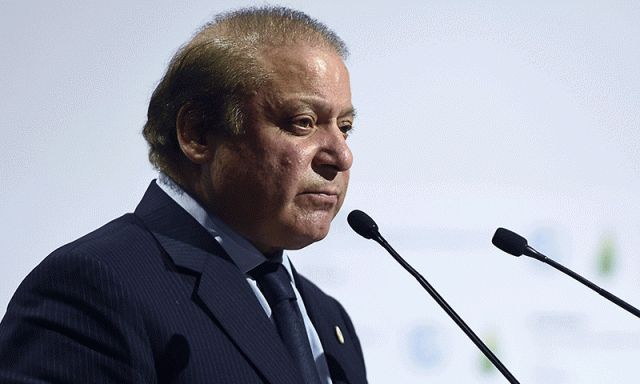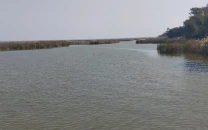Panama leaks scandal: SC refuses to form ‘lame’ inquiry panel
Chief Justice of Pakistan Anwar Zaheer Jamali asks govt to enact proper law for creating powerful body

Prime Minister Nawaz Sharif on April 22 requested the Supreme Court to form an inquiry commission to investigate the Panama leaks. PHOTO: AFP
Prime Minister Nawaz Sharif on April 22 requested the Supreme Court to form an inquiry commission to investigate the Panama leaks, which on April 3 revealed that the prime minister’s three children were among hundreds of people with offshore holdings in a tax haven.
Panama leaks panel may be chasing shadows
The government had also formed the commission’s ToRs, which had broadened the scope of proposed investigations beyond the leaks to include all corruption cases including waiver of bank loans. Opposition parties, however, rejected the government’s ToRs and called for new legislation for the probe.
“Formation of a commission of inquiry under the Pakistan Commission of Inquiry Act 1956, looking to its limited scope, will result in the constitution of a toothless commission, which will serve no useful purpose, except giving a bad name to it,” said the Supreme Court’s one-page’s reply, sent to the law secretary by the Supreme Court through its registrar Arbab Muhammad Arif.
Apparently endorsing the stance of superior bars and opposition parties to form the commission under a new law, the court expressed its desire to form the body under a new law and asked the government to do proper legislation for creating a powerful commission.
No judicial inquiry into Panama Papers leak till CJP’s return in May
The apex court also expressed reservations over the federal government’s proposed ToRs. “The ToRs are so wide and open ended that, prima facie, it may take years together for the commission to conclude its proceedings.”
Before forming any opinion on the government’s request to form the commission, the court also sought a list of all individuals, families, groups, companies, etc, with their total number along with some relevant particulars against whom purported inquiry proceedings are to be held.
“Unless such information and particulars are provided and the issue of formation of a commission under some proper legislation is reconsidered and resolved, no final response to the government’s letter will be furnished,” the CJP’s letter said.
Commenting on the development, legal experts said the Supreme Court is interested in gaining more powers before the creation of the commission as it has specifically mentioned that the proposed commission under the existing law will be ‘toothless’ and will give it ‘a bad name’.
Govt announces ‘open-ended’ inquiry
Talking to The Express Tribune, top jurist Khawaja Haris said before approving the government’s request to form the commission, the top court wants to ensure that the integrity of the superior judiciary is not be compromised. Therefore, it has given guidelines to the federal government on the issue, he added.
Highlighting flaws in Pakistan Commission of Inquiry Act 1956, he said the federal government has the authority to wind up the inquiry at any stage under the same law and that there is no legal effect of the commission’s findings as the government is not bound to make the report public.
“There is no precedent in Pakistan’s legal history, wherein the Supreme Court has declined the federal government’s request to nominate judges for the constitution of a commission. Likewise, it is going to be the first instance when the judiciary has set out certain guidelines to the executive before formation of a commission,” Haris said.
He agreed that it is possible for the federal government to raise legal questions over the judiciary’s response, giving guidelines to the federal government through a letter. “However, it will not be possible for the government to do the same, therefore, it will consider the SC’s suggestions,” he added.
Khawaja Haris, who has been appointed amicus curiae by the court in a number of high profile cases, recommended that the federal government enact legislation as it had done for the commission, which probed alleged rigging in the last general elections.
Pakistan Muslim League-Nawaz’s (PML-N) senior lawyer Zafar Ali Shah appreciated the SC’s response to the government. “However, as the political system is at stake, both the government and opposition parties should show maturity and solve the issue immediately,” he added.
Supreme Court Bar Association (SCBA) former president Yasin Azad said the judiciary has taken the right decision by giving certain guidelines to the government on the framing of new ToRs. Active lawyer Chaudhry Faisal Hussain said the court wanted to gain more power before forming a commission.
SCBA to invite govt, opposition
Meanwhile, the SCBA –the apex body of senior lawyers of Supreme Court of Pakistan – will invite government and the opposition to frame the ToRs mutually acceptable to all the parties.
SCBA President Ali Zafar told The Express Tribune that he would be writing a letter to the government and the opposition today (Saturday) to offer help of his office in this regard.
The SCBA had earlier framed its own ToRs to investigate the leaks. However, the government had not given any importance to them. Given the say key lawyers bodies have in legal matters, the SCBA president has been meeting the CJP in the aftermath of recent developments.
He was quoted as telling media persons after one such meeting with the CJP earlier this week that it was likely that the SC would decline the government’s request for a commission with their ToRs.

A scanned image of the Supreme Court letter. PHOTO: EXPRESS
Published in The Express Tribune, May 14th, 2016.



















COMMENTS
Comments are moderated and generally will be posted if they are on-topic and not abusive.
For more information, please see our Comments FAQ